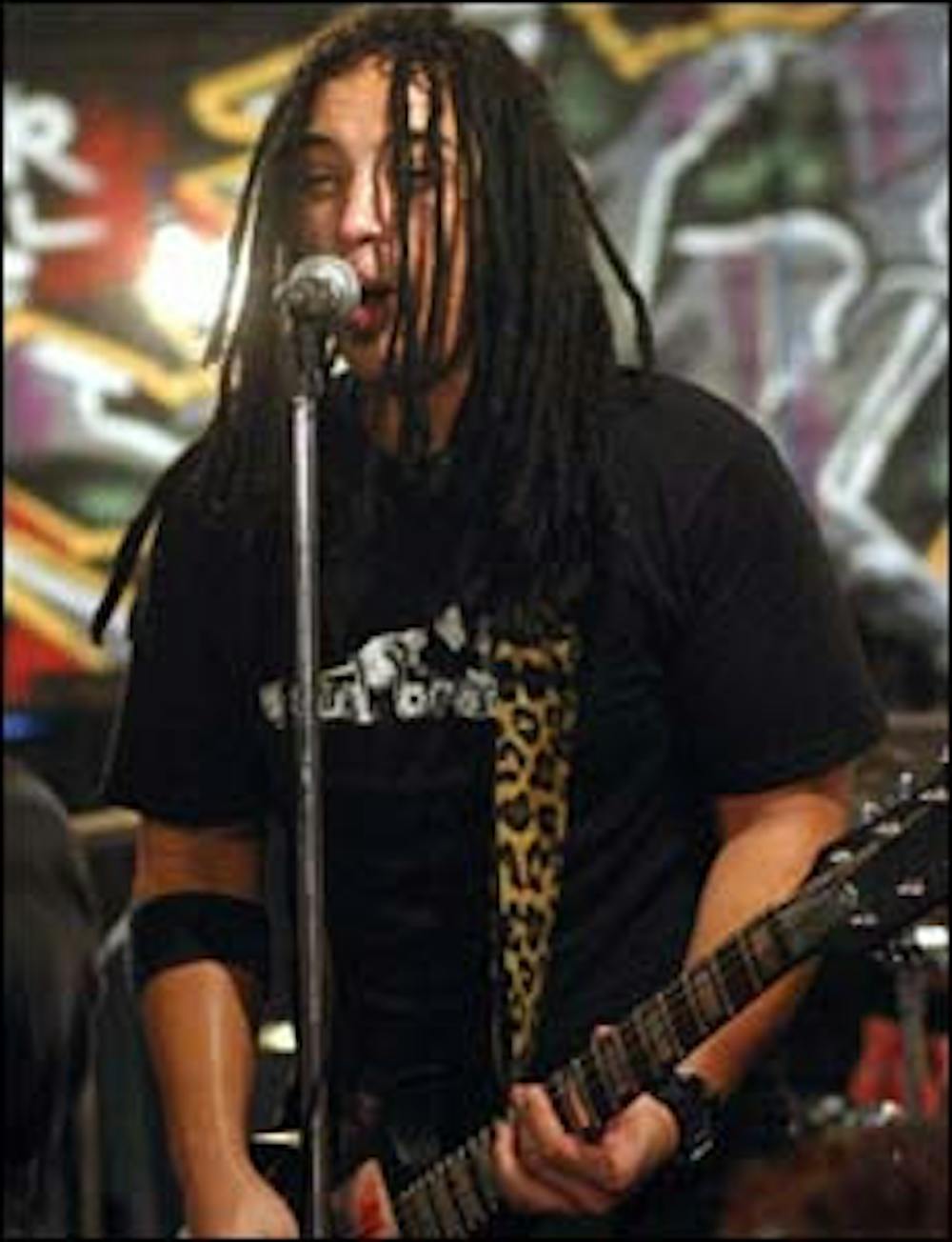Remember in the movie Wayne's World when Wayne and his cohorts manage to get his girlfriend's band, Crucial Taunt, to play for a record executive in hopes of getting them signed and becoming rich and famous? Millions of people dream of scoring that phenomenal record deal that will change their lives, but only a handful get signed to major labels and even less make any money.
In the first year after being signed to a major label a person's life changes, but not always in the way expected.
Jeff Jaworski, lead vocalist and guitarist for Red Tape, had his cell phone turned off because he couldn't pay for it despite having a contract with Roadrunner Records.
Curtis Williams, guitarist for the Virginia Beach band, To The Grave, had a great tour that gained his band exposure, but then was told to change his band name.
Atreyu vocalist Alex Varkatzas learned after signing to Victory Records that you make no money from album sales, and Elektra Records' Sworn Enemy vocalist Sal LoCoco found out that if you do not stay on the phone with the major labels, you can be forgotten.
Schwing!
Jaworski fits the image of what a front man for a punk rock band should look like. He has long, black dreadlocks, a half sleeve of tattoo work on his right arm and a ring around his lip. He looks like a rebel. The moment he begins talking about November 2002, when his Sacramento-based band got signed to Roadrunner Records, he cracks a grin.
"I was sending our demo to every tiny one-man-in-a-basement label," Jaworski says with a chuckle. It was not he who sent a demo to Mike Gitter, artist and repertoire (A & R) for Roadrunner Records. In the summer of 2002, Red Tape's manager mailed a copy of the demo directly to Gitter.
Gitter says he was blown away by the band's demo recording. It had great riffs and catchy lyrics. He saw potential. Gitter called Jaworski, and after a few phone conversations, Gitter flew from New York to Sacramento to meet the band and check out its live show.
"He was very upfront about everything," Jaworski says. "Before he flew out, he said if he liked the show he would want to sign us, since he liked the recording so much."
Gitter says, first and foremost, it was the music that convinced him. However, there were other key factors in deciding the band was ready to be signed: they had killer energy on stage, a solid fan base and great merchandise sales.
"Everything else was just a matter of not sucking, as far as live performance and our attitudes," Jaworski explains.
The official word had to be passed through several channels before the band learned about their new success. Jaworski was thrilled to be on the same label of underground punk, hardcore and metal bands that he had always admired, like Deicide and Misfits. Plus, he had seen articles about Roadrunner bands in magazines such as Rolling Stone and Alternative Press.
The next two months the band went about their daily lives as if nothing had changed.
Jaworski returned to his job as a customer service representative at The Sacramento Bee newspaper. Other members of Red Tape kept their day jobs of installing bathrooms, folding boxes and painting houses. All the while, Roadrunner Records and Red Tape's manager and lawyer hammered out the finer points of the contract.
Ex-squeeze me?
In his thick Brooklyn accent, LoCoco from Sworn Enemy points out that it is much more important to have a good attorney than a good manager. "He'll make sure you don't take it in the ass when management try to screw you," LoCoco says.
Many musicians who have been through the tedious ordeal of negotiating a contract with a label will say you cannot come out unscathed without a lawyer familiar with the music industry.
"Basically, they help break down all the music industry jargon like 'mechanical royalties' and shit into a language the average musician dork can understand," Jaworski says while rolling his eyes. He makes a point to note he hates the legal stuff. He goes on to say that Red Tape's lawyer is familiar with both sides, as he formerly was the singer of Sha-Na-Na.
After getting signed, Red Tape, with help from their lawyer, had to defy its punk rock ideology and become a corporation. A band that sings about anarchy and has a song entitled "Stalingrad" became Red Tape, Inc.
"Punk rock equals anti-establishment and big, evil corporations are the enemy. That's still true," Jaworski explains. "Punk rock and lefties aren't simply against the word 'corporation.' Some of your favorite record labels, clothing manufacturers, bands -- all sorts of punk-related things are incorporated, but we're not running sweatshops or raping the rainforests."
He justifies the move: "If you go and break your face at one of our shows and try to sue our ass, it protects us as individuals. You have to sue Red Tape, Inc."
A lawyer is useful for more than the initial dealings with the record label. Another important skill for a music industry attorney is to be well versed in copyright law.
The members of To The Grave, a hardcore band signed to Stillborn Records, sought out a copyright attorney to trademark its former band name, The Takeover.
For a variety of reasons, including merchandising, it is good to own your name, says Curtis Williams, the tall, 26-year-old guitarist for To The Grave. This way, a couple years down the line, you will not be sued for using your band name on T-shirts if another company or band has the same name.
"It turned out that there were already two companies, a clothing company and a management firm, in court battling over the name, 'The Takeover,'" Williams explains. After their lawyer laid it all out for them, they realized they had no chance of getting the name, Williams says
The band was now faced with the daunting tasks of finding a new name, creating a new logo and new merchandise and disposing merchandise with "The Takeover" emblazoned on it. It sold what was left of The Takeover merchandise on its last tour and are in the process of creating a new Web site.
We're not worthy!
Recording an album for a major label is a different kind of experience than creating an independent recording or a small label LP, as Jaworski learned. It takes adjustment and tends to be a considerable learning process for first-timers.
"Overall, the whole process is longer, yet more intense than anything any of us had experienced!" he says. "We can thank Roadrunner for the decent recording budget, which allowed us to go all out, trying lots of different takes and ideas."
Varkatzas learned a similar lesson.
"Recording for Victory Records on Suicide Notes and Butterfly Kisses was better because we actually had money from the label to use," says the hardcore singer. "For Fractures (Tribunal Records) we recorded using our own money, so it was a stressful and really, really short recording process.
"(With Victory) we were in a nicer studio. Sadly, we didn't know the first thing about professionally making an album, so we wasted a lot of time."
The label caused a few headaches during the recording process. They were kind enough to pay for Red Tape's recording, but the band was on their own for rent and bills. Jaworski explains it succinctly: "All my credit cards got maxed out and my personal finances went to shit."
The other major headache members of Red Tape were forced to endure was a long battle over the title of their album. Was the band after something vulgar? No. Did they want to use something that would cause a lawsuit? No. The band merely wanted to use a song title it felt represented what it was all about -- Radioactivist.
"Gitter wanted us to call this album High Revoltage!, which was the name of our first release," Jaworski says. "He loved the title so much he was overlooking the fact that a few people had actually heard of it. It was like denying our past.
"Gitter's justification for using the title was that it was just such a wonderful album name," Jaworski explains. "That was stupid to me, because I remember every record review of the album; they would always call the album "High Voltage," and it drove me crazy. We stuck our ground and won out. Radioactivist completely fits what we're all about. Right down to it being a completely made-up word!"
There is a downside to not having the label watch a band's every move, as the members of Sworn Enemy learned.
"Elektra was cool to us considering we're a nobody band," LoCoco says, "I wish they would have pushed us a little harder than they did. We kind of got lost in the mix."
No 'Stairway?' Denied.
One myth in relation to musicians is that once a band is signed it magically become rich and members can quit their day jobs. However, while many do quit their jobs, they are hardly living off the dough they rake in from album sales.
"We had to quit our jobs 'cause we tour so much," Varkatzas says. "Any money we make is from touring. We don't see much, if any, from album sales or from anything else.
"When we are home some of us work, and some of us don't. We are lucky enough to be in a position where we tour enough to live. That's really nice."
To have time for touring and recording, Jaworski says, he has cut back his hours at The Sacramento Bee. His choice, though, has resulted in him being broke. In an e-mail, he writes that because of international calls for interviews and the decreased working hours, he could not pay his cell phone bill and consequently, it was shut off.
Luckily for Jaworski, his band is getting more quality tours. Red Tape is are currently on a two-week West Coast tour with punk rockers T.S.O.L. and will be spending time with Mastodon and The Bronx in coming weeks.
"We can make money on touring and merchandise," Jaworski explains. "Selling shirts at shows is usually where the money is at. CD sales won't really mean squat unless you're selling like half a million. I'm putting my faith in being on the road."
When a band is spending the majority of its time on tour, it is forced to trust its label with the handling of its image and proper marketing of its album. The label can contact the band, but when you are in a different city every night, you have to hope that those at your label understand what your band is about.
"Victory has never attempted to change the way we look or sound," Varkatzas says. "They know that would never fly with us, so they have never tried."
Jaworski says he felt at home at the Roadrunner offices. "It was nice to see all the punk and metal stickers on everyone's doors and cubicles," he says. "We stayed at our A & R guy's house for a few days and met his lovely wife and cats, and ate their food -- Gitter's food, not the cat food."
Jaworski says his label makes a point of trying to run ideas by the band beforehand, but there are instances where there is no time for that.
"What I've learned is you have to push to get what you want sometimes," Jaworski advises. "Whether it's how your CD layout turns out, how a magazine ad is going to look or contacting who's in charge of whatever. You have got to be firm and persistent, but have patience. It's also a good idea to pick your battles."
Red Tape was not thrilled with the marketing slogan "Pure Punk Power." Despite arguing and angry phone calls, stickers and advertisements for the band are stamped with the phrase.
Party on
"Always be prepared to take matters into your own hands. We're big on keeping a DIY (Do It Yourself) ethic. It's not just honorable, but it's good business," Jaworski says.
A handful of bands get signed and one or two will make some money or survive to a second album.
Varkatzas is a step ahead. Atreyu's video for "Lip Gloss and Black" is getting airplay on M2 and Fuse, and he is currently in Canada recording the sophomore album for Victory.
Williams' band, To The Grave, is hitting the studio as well to record its debut album on Stillborn. Members will play at the New England Metal and Hardcore Festival in May, then plan to tour for at least a year.
LoCoco says he is doing well. Sworn Enemy is headlining a tour with As I Lay Dying and Himsa, and the band has begun writing for its next album.
Jaworski is at a fork. Red Tape's Roadrunner Records debut comes out on Feb. 10. A year's worth of work -- writing, recording and fighting with the label is finally materializing. Jaworski is hyped: "We just shot the video for 'Stalingrad' and our album is about to drop. I'm ready to hit the road; just play my guitar and not worry about anything else."
Reach the reporter at chelsea.ide@asu.edu.






